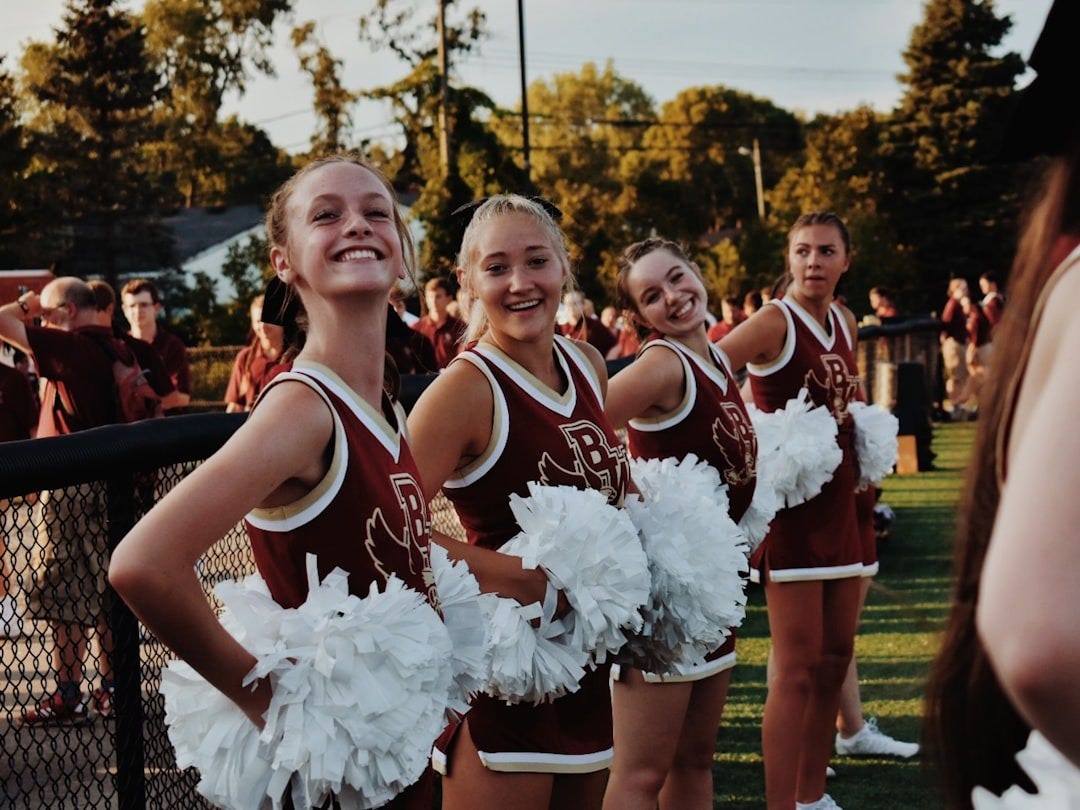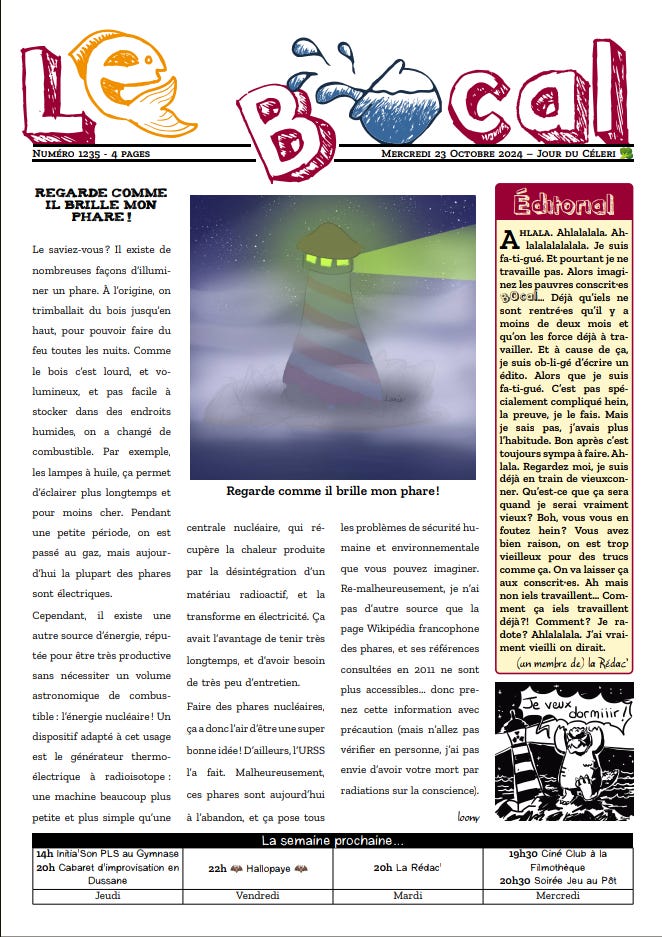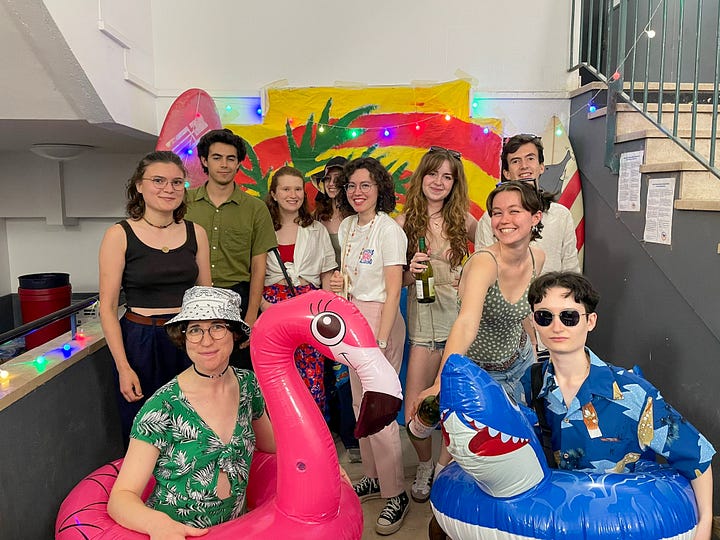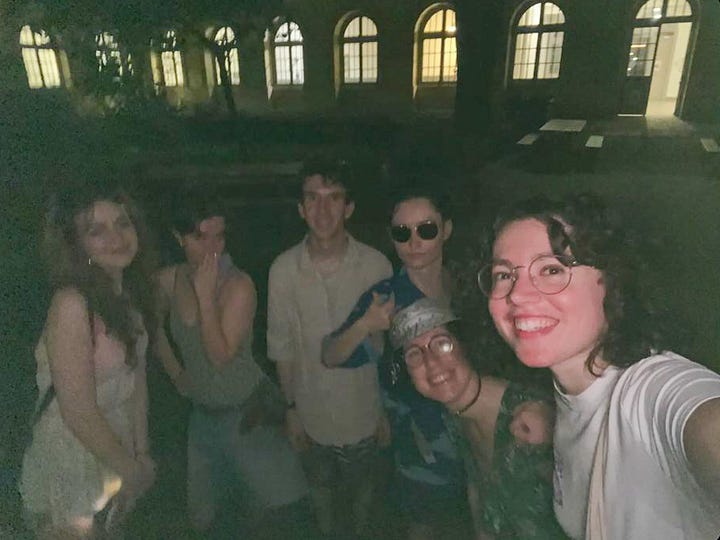Pom-poms, PowerPoints and plage parties
My first two weeks at the ENS were some of the most jam-packed days of my life

“À Ulm, à Ulm, on sait danser,” (At Ulm, we know how to dance) chants a packed gym of ENS students, as two performers, dressed in a chameleon and a princess costume respectively, exit the stage, following a terrifically surreal performance full of jumps, lifts and hilarious storytelling.
No, this wasn’t a fever dream; this was a two-hour-long showcase of the innumerable different dance societies at the ENS. Of all these clubs, none is so important as les pom-poms (cheerleaders). Known elsewhere in France as les pom-pom girls, at the ENS, these performers can be of any gender. What can I say? We’re woke like that.
In general, the ENS is not known for its sporting prowess. But les pom-poms are the heart and soul of the school—“l’âme de l’ENS,” as my French teacher put it. Dressed in yellow and purple outfits reminiscent of classic teen movies and performing hits by Lady Gaga and Chappell Roan (nothing is funnier than hearing “Femininomenon” said in a French accent), the troupe frequently win Les Inter-ENS, a competition between the four écoles normales supérieures across France.
At every party, around midnight, the music stops, we all sit down and chants of “pom-poms, pom-poms” echo through the room. Soon, everyone is cheering, despite the painful positions we find ourselves crouching in, as the legends themselves sashay away to “Womanizer” by Britney Spears.
Societies
Dance clubs aren’t the only societies at the ENS, though you would be forgiven for thinking so. Every day throughout the two-week orientation period, a freshers’ fair was held en courô at lunchtimes. To encourage students to join their societies, the heads of each stall initiated very practical demonstrations. Hence, to get to the canteen, one had to avoid colliding with a pole dancer, being blasted by trumpets or merging with a musical theatre flashmob.
“To get to the canteen, one had to avoid colliding with a pole dancer”
The biggest ENS societies are COF (Comité d’organisation des fêtes or “party organising committee”) and BDS (Bureau des sports, “sports office”). Joining these costs money but, afterwards, all the clubs are free: you can watch films using an old-timey projector each Wednesday, play hours of Dance Dance Revolution on Tuesdays or (my personal favourite) put maximum effort into achieving minimal results with the Club inutile (useless club).
The BDA (Bureau des arts) provides cheap theatre and concert tickets to students; I’ve already seen a wonderfully strange exploration of toxic masculinity—more on this later but let’s just say, it began with a man standing in a pile of dirt. Indeed, for such a small institution, there are a ridiculous number of societies. Below is an example of Le Bocal, the ENS newspaper:

French lessons
Besides avoiding rampant dancers, my first two weeks mainly consisted of attending intensive French lessons. Only a day in Paris and I was already completing a language test to determine the class I would join—one, I might add, that continually accused me of cheating whenever I tried to add accents to my work.
Thankfully, I wasn’t kicked out there and then but instead placed in a class with most of the other Cambridge students. Our first activity was to pick a drawing that related to us from a pile and explain this connection to our partners—all well and good but the images resembled those from the boardgame Dixit and, by that, I mean they were totally indecipherable.
Then, there was the added difficulty of remembering your partner’s name (not my strong suit), all while struggling to think of interesting things about yourself (I’m sure I made a great first impression by explaining that I’d spent the previous day writing horoscopes…).
We learned old people’s slang (it turns out no one says “casser les pieds” to mean “annoy someone”; everyone uses the much ruder— and unpronounceable—variant “casser les couilles”. I’ll let you Google that one!) and modern slang. We discovered that, somehow, there are STILL things about the French number system we don’t know, despite it being one of the first topics you cover.
We also spent years covering the very specific way you must write French emails, which is essentially the opposite of English etiquette: never start an email with “I hope you are well” (that’s far too personal); indeed, never open with “I” (or you’ll sound big-headed); when signing off an email to someone you don’t know, the best option is “respectfully”—imagine how passive aggressive that would come across in England!
Us Cambridge students confused everyone by all having shortened names—I didn’t realise that was less of a thing outside the UK. We then multiplied this confusion during presentations about our hometowns. Flossie (Florence) discussed the stuffed walrus of Lewisham; Millie (Amelia) celebrated the Morris dancing, daffodils and sticky toffee pudding of Cumbria; And I (Alexander) exposed the lack of diversity and strange fundraising initiatives (rubber duck racing) of Church Stretton.
Receiving an applause was truly a highlight of my week—not that I’m desperate for validation or anything—and it was fascinating to hear about everything from deforestation in Germany to the fierce rivalries between Italian regions.
Being students themselves, our teachers were well placed to provide helpful recommendations of things to do in Paris and explain how the French language is evolving to become more inclusive (though it sure has been strange seeing them at every party since!).
I’m not going to pretend four hours a day didn’t feel like a lot, especially once we’d moved from numbers to debating universal basic income and analysing Victor Hugo. However, the lessons were a great way to meet other internationals and adapt to using French all day—that and they mean I already have six of my 15 credits.
All I needed to do to validate the class was write a story about a foreigner arriving in France, which was great fun. I even had him teleport from London to Paris by means of magic wine…
Talks
My days also featured numerous talks, including one by the languages department during which a student suddenly shouted, “point of information” and launched into a debate. After this triggering reminder of the Cambridge Union (aimed at advertising English debating society), there was then the embarrassment of the department head pleading with the audience to make friends with international students.
The ENS is big on consent—obviously a good thing. However, this did mean having to endure a two-hour session on sexual assault. It was interesting nevertheless to learn how French law works, especially given the Affaire Mazan that is currently gripping the headlines. Did you know, for instance, that it is technically illegal to make a sexist remark in France?
Outings
But these weeks involved more than just sitting in classrooms for longer than my attention span; thankfully, the ENS seemed to have an almost unlimited budget when it came to entertaining international students (French taxpayers, I’m sorry. Just know that I had fun).
During our cinema trip to see Le Comte de Monte-Cristo (100% would recommend), we discovered the truth of French timings: having met at 5:30pm, we didn’t leave until 6:30pm, only to be told, upon arriving at the cinema and receiving our tickets, that we were free until 8:30pm. Never mind, we had a nice Chinese takeaway in the meantime.
We also saw Eugène Ionesco’s absurdist play La Cantatrice chauve at the miniscule Théâtre de la Huchette. Though likely bewildering in English, let alone French, the show had some hilarious moments and did well at making fun of us Brits.
Lastly, the ENS forked out €60 a box for a macaron tasting event with our buddies (students we were paired with from higher years). They were delicious but, safe to say, that’s the last time I will be eating them.
Parties
Whereas, at Cambridge, the pressure of joining a prestigious institution seems to fuel our horrendous drinking culture, at the ENS, these expectations instead drive students to prove their superiority by cutting down on alcohol and becoming vegetarians.
Obviously, this is a generalisation but it was amusing to see our friends’ faces when Millie and Flossie revealed that Cambridge students often drink a bottle of wine each at formals.


However, this shock may have more been the result of the wine they were drinking in preparation for a “Beach Dance Party” at the ENS bar: a two-euro bottle from Carrefour that was promptly labelled “dégueulasse” (no translation needed).
Despite our oenological differences, we have been successfully incorporated into this lovely French friend group, which is excellent because the intimidating size (don’t laugh) of our Cambridge group—there are six of us at the ENS, around 30 in Paris—initially hindered making friends with other internationals.

I may have made fun of Flossie and Millie for ending each day by congratulating themselves on their social achievements. But they’re right. We did do “so well”.
Before coming, I was warned of the impossibility of making French friends. So, I’m incredibly grateful to the whole group for tolerating our personality-less French!
Surely that’s it, right? I can’t possibly have fit more than that into my orientation weeks…
Wrong. I also watched the Paralympic powerlifting finals with my flatmates. As you might guess, powerlifting isn’t one of my greatest passions. However, the competition was riveting. In the women’s category, for instance, it seemed certain that China would win, only for Brazil to take the trophy at the last minute. Unfortunately, I do not have a photo of my face in that moment.
And that’s not all: the ENS also organised a weekend away to the south of France. However, you’ll have to wait until next time to hear about it…
Following fierce criticism of my last fun fact, I'll let you decide your favourite option... (with help from @sachasangels)








